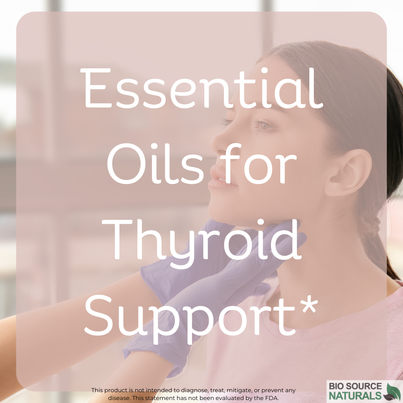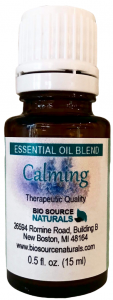Essential Oils for Thyroid Support
Essential Oils for Thyroid Support
 Essential Oils for Thyroid Support – My Story by Veronica Roman
Essential Oils for Thyroid Support – My Story by Veronica Roman
Essential oils for thyroid support have the ability to regulate, normalize, and support the thyroid gland.* Many individuals have heard of the thyroid, but don’t know where it’s located in the body or what it does. Since I had been diagnosed with a thyroid issue, I’ve found it was important to educate myself about the thyroid, so before discussing the types of essential oils for thyroid support that will help with thyroid issues, see some additional facts about the thyroid, below.
The thyroid is located below the Adams apple at the base of the neck, and is part of the endocrine system that produces the hormones of the body. It is considered the “energy gland” of the body. It is very important and is responsible for many bodily functions including regulating metabolism (T3 and T4 thyroid hormones) and secreting hormones for circulation, immune function, digestion, body temperature and even emotions.
There are generally two types of thyroid conditions that need treatment – HYPOthyroidism (UNDERactive thyroid – the thyroid is not making enough of the thyroid hormones) and HYPERthyroidism (OVERactive thyroid- the thyroid is making too much of the thyroid hormones). Hypothyroidism is more common than hyperthyroidism (1-2% v. .5%), according to the Cleveland Clinic for Continuing Education.
A few of the common symptoms of HYPOthyroidism are: lack of energy; fatigue; weight gain; yeast infections; reduced immune function; and hair loss.
A few of the common symptoms of HYPERthyroidism are: restlessness; insomnia; anxiety; nervousness; muscle weakness; fatigue; weight loss; diabetes; arthritis; hair loss; enlarged thyroid gland; premature grey hair; heart palpitations; and vitiligo (a condition in which the skin loses melanin and slowly causes enlarging white patches of irregular shapes to appear).
You may have noticed that a few of the symptoms between the two conditions are similar, such as fatigue and hair loss. However, the cause of the symptoms are quite different – underactive v. overactive thyroid – and both require different treatments.
My Story
My own experience with being diagnosed with a thyroid condition started almost a year ago when I progressively became more and more fatigued over time, eventually feeling the need to take a nap in the middle of the afternoon most every day! Thankfully, I have a flexible schedule so this was possible most of the time. But it was a huge red flag because I knew this couldn’t be normal. I’m usually a physically active person and love to bike and hike, so feeling fatigued prevented me from doing activities that brought me joy. When I got to the point where I could hardly take a 20-minute walk with my dog without feeling so weak in my knees that I thought I would fall over, I knew I had to see a doctor!
Being more inclined to seek alternative treatments, I went to my chiropractor who also was certified in applied kinesiology (muscle testing) and nutritional counseling. She thought I might have a thyroid issue, but nothing showed up with her tests which did indicate, however, a virus that was possibly attacking my pancreas. She also found I was extremely deficient in zinc (which means I probably had way too much copper in my body since the two have an inverse relationship). She gave me a supplement for viral infections and some aqueous (liquid) zinc, but also sent me to a nearby lab to have some blood work done, a very smart thing (in my opinion) for anyone to do in conjunction with other diagnostic therapies if they are experiencing ANY symptoms that are not normal.
When she called me with the blood test results, she told me I had HYPERthyroidism, as indicated by the thyroid hormone levels on the blood test. I also had borderline high blood sugar levels, also a symptom of hyperthyroidism. Those two indicators, along with my general fatigue; weakness in my legs; occasional heart palpitations and nervousness/anxiety all pointed to hyperthyroidism. And depending on the cause, different medical treatments were available.
Because this is such a new diagnosis for me, I’m in the process of making choices regarding my treatment options. My belief in following a more natural and complementary treatment plan (versus something more traditional) led me to do a lot of my own research where I learned that, especially with hyperthyroidism, there can be many different causes and that a combination of lifestyle changes, done simultaneously, will help dramatically.
I learned that eating a gluten- and caffeine- free diet is extremely helpful and that certain personality characteristic are prone to getting hyperthyroidism (personality characteristics that I possessed!). I also found that following these lifestyle changes, along with focusing on relaxation (i.e. meditation) and resting often (NO exercise!), were helpful in the first 6 months of getting hyperthyroidism under control.
Much to my dismay (because I don’t like to take prescription medications) I also found out that it may be necessary for me to take medication for a few months until the thyroid becomes “normalized” again. However, through my research I also determined that some drastic measures, such as removing the thyroid, are usually not necessary. And that another helpful thing to do is to use essential oils for thyroid.
Essential Oils for Thyroid Support
Essential Oils to use for UNDERactive thyroid support (hypothyroidism):*
- Spearmint – Stimulates the secretion of hormones and keeps the metabolism activated and functioning properly. Also boosts the immune system by stimulating blood circulation.
- Peppermint – More powerful than spearmint due to its much higher menthol content, but is also a stimulant with similar benefits.
- Clove – Helps to stimulate the thyroid.
- Myrrh – Helps to stimulate the thyroid.
- Rose Geranium – Helps to stimulate the thyroid.
- Frankincense – Strengthens the immune system.
- Cedar Wood – Stimulates metabolism.
Essential Oils to use for OVERactive thyroid support(hyperthyroidism):*
- Sandalwood – Sedative that calms anxiety, fear, stress, and restlessness while inducing relaxation, calmness, concentration, inner vision, and positive thoughts.
- Frankincense – Very effective as a sedative. It induces a feeling of mental peace, relaxation, satisfaction and spirituality. Ends anxiety, anger and stress, common mental symptoms of hyperthyroidism.
- Pine– Has an immediate grounding effect and is great for centering, calming and focusing.
- Lemongrass – Acts as a tonic for the nerves and the nervous system. It helps cure many nervous disorders such as shaking hands or limbs, and nervousness. It strengthens nerves and activates them. Also an excellent sedative with great soothing and calming effects on the mind, relieving tension and anxiety. A great aid to those with insomnia, a common symptom of hyperthyroidism. Strengthens the immune system.
A general rule for using essential oils for thyroid is that for an underactive thyroid, use oils with stimulating properties. For an overactive thyroid, use oils with sedating and calming properties such as our Calming Essential Oil Blend available in concentrate, rollon, massage oil and spray..*
— Veronica Roman
Purchase the essential oils listed above, plus carrier oils to dilute them, below.
Additional information about essential oils and the thyroid can be found here.
*This statement has not been evaluated by the FDA and is not intended to diagnose, treat, or prevent any disease.

I thought to take the time to comment on this blog and attest to the fact that I thougroughly enjoyed reading the content.
Thank you! We really appreciate it, hope you enjoy our newer blog posts as well.
thank you! i have just been diagnosed with a form of hyperthyroidism and early stages of graves disease, looking to work with oils to help! this was good information thank you!
Just curious if natural methods alone were sufficient for treating your thyroid? I’m in the same situation.
Thank you for this information. I have a hyperthyroid condition and many other essential oil sites recommeded myrrh, frankincense, lemongrass, clove, peppermint and marjoram. But after reading your blog and researching each oil individually I see that many of those oils are for an underactive thyroid.
Hello Rande,
Oils can be quite useful as part of a more complete regimen in dealing with thyroid issues. Thyroid (and any hormonal) issues are very complex, and oftentimes it may be more than the thyroid that’s involved, as the glands of the endocrine system are quite intertwined when it comes to the secretion of hormones. I’m not a medical professional, so I encourage you to seek out a naturopath or other holistic practitioner who has experience with treating hormonal conditions. A supplement you may also want to research is “Ashwagandha,” which is called an “adaptogenic” herb because it can customize itself to what your body needs. There are also other supplements and specific foods that are considered beneficial for thyroid health. Watching your sugar, dairy, and gluten intake may also be beneficial. I encourage you to do some internet research, which may give you some very good information!
Thank you for your comment, Donna. Yes, many do confuse “hyper” v. “hypo” thyroid, and it’s important to pay close attention to the articles that are out there!
Thanks for your comment! We hope you’ll continue to read our articles and follow us as we expand our business and offer premium essential oil products.
Please be mindful even when seeking out a naturopath. Mine has over 30 years experience, is a master herbalist & friend. I developed symptoms of hyperthyroid 6 mos. ago ( said I showed low T4) & they advised L tyrosine, brazil nuts, and a natural thyroid supplement containing glandulars & kelp + other ingredients. . Relief only for a week. Many parts of the endocrine system can be affected. Naturopath put me on a endocrine support supplement & kelp capsules. I continued to get worse. I was sleeping 0 to 3 hours per night for 3 weeks and taking sleep teas and herbs. When I could hardly walk I went to a medical doctor who thankfully referred me to an endocrinologist I saw 2 days later. (I avoid doctors like the plague, but this was really bad). Endo. thought I might be in a kelp induced “storm”. Labs were taken. After 3 weeks on beta blocker, I went to a spiritual conference called For My Life in Thomaston Georgia and, after a week there I felt 40% better appying what I learned about spiritual roots to disease. I am now on a beta blocker for tremors and papitations and methimazole now to stop the thyroid hormone flow. I can’t say I like the meds but considering the alternative. Testing has revealed numerous nodules on the goiter & thyroid and removal was recommended. I am using my imagination seeing a healthy thyroid along with healing scriptures & spiritual “walk out” I learned at conference. I believe this will make a huge difference in my outcome. I do recommend that anyone with hyperthyroid get tested and get the recommended labs, ultrasound & thyroid uptake scan. Then you can make your choices after that. I have always used natural means for health issues & have done well for my 65 years. I was also told testing showed osteoporosis, which may be spurred on by hyperthyroid. I am not on the recommended meds. I am checking into plant based calcium supplements that have some testing behind them. I wish you all wellness & suggest really getting fear, worry & anxiety out of your life. One thing for sure I have conquered fear of doctors & taking blood tests! lol
Is it safe to consume cherry active concentrate if one has hyperthyroidism?
So do i just rub the oil on the thyroid gland?